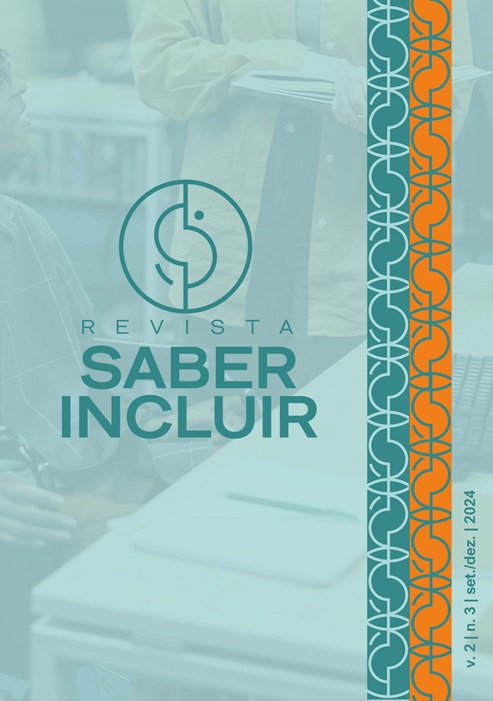CURRICULAR CONSEQUENCES OF TUTORIAL SUPPORT FOR PORTUGUESE STUDENTS WITH SPECIAL EDUCATIONAL NEEDS IN AN INCLUSION CONTEXT (CASE STUDY)
Keywords:
Tutorial Support, Curricular flexibility, Specific educational needsAbstract
Decree-Law No. 54/2018, of July 6, allows the learning and inclusion of Portuguese students with specific needs, benefiting from Tutorial Support. The scope of the qualitative methodology used, in the case study modality, aimed to understand the contribution of tutorial support in accessing the curriculum by those students in a School Group. It is an exploratory research (observational, transversal, descriptive, analytical, interpretative) based on the objectives: understanding the meaning of tutorial support; and characteristics of the teacher-tutor; identify the knowledge of the subjects under study about the role of the teacher-tutor; characterize the intervention methodologies developed in tutorial support; understand the advantages of tutorial support for students’ access to the curriculum; get to know various areas of skills worked on in tutoring. The sample includes 4 students, intentionally selected, beneficiaries of the 2022-23 academic year of that normative support measure, their parents, class directors and coordinator of the support and special education team. We used data collection techniques: participant, non-participant and documentary observation; semi-structured interviews; field notes. We submit the data to content analysis, grouping relevant information into categories and subcategories, interpreting them on the basis of triangulation. We comply with ethical and legal research procedures. The results confirmed that tutoring is a mediator and enabler in accessing learning for students with specific needs, as long as it is adjusted, considered, structured and monitored. We found that Tutorial Support contributes to access to the curriculum, relational compensation, promotion of skills, adaptation to the curriculum, an effective exercise of autonomy and curricular flexibility.
Downloads
References
ABELHA, Marta Cristina Lopes. Trabalho colaborativo docente na gestão do currículo do Ensino Básico: do discurso às práticas. (Dissertação de Doutoramento em Didática). Universidade de Aveiro. Aveiro, 2011. Disponível no site https://ria.ua.pt/handle/10773/3718
AINSCOW, Mel; DYSON Alan & WEINER, Sara. From exclusion to Inclusion. A review of international literature on ways of responding to students with special needs in schools. Berkshire: CfBT, 2012.
BAPTISTA, Mª da Nazaré Mesquita dos Santos. A tutoria em contexto escolar - A influência das tutorias na prevenção de trajetórias desviantes. (Tese) Dissertação Doutoramento em Educação, Instituto Educação, ULHT. Lisboa, 2011 https://recil.ensinolusofona.pt/bitstream/10437/8570/1/Tese%20final%20final.pdf
CORREIA, Luís de Miranda. Inclusão e Necessidades Educativas Especiais. Porto: Porto Editora, 2008
DENZIN, N. K.; LINCOLN, Y. S. O planejamento da pesquisa qualitativa: teorias e abordagens. 2. ed. Porto Alegre: Artmed, 2006.
LOURENÇO, Lucinda Fernandes. Tutoria. Um caminho possível para o sucesso escolar. Dissertação de Mestrado em Ciências da Educação. Instituto de Educação da Universidade de Lisboa – Universidade de Lisboa, Lisboa, Portugal, 2012 https://repositorio.ul.pt/bitstream/10451/7586/1/ulfpie042883_tm.pdf
MARTINHO, Cristina Margarida Marques Fonseca. Projeto de Tutorias em meio escolar. Lisboa: Edições Lusófonas IE/ULHT, 2011
MOTA, Lídia Cristina Sanches. Constrangimentos e potencialidades da implementação da flexibilidade curricular numa escola do distrito do Porto. Dissertação de Mestrado em Educação – área da Administração das organizações Educativas – Instituto Politécnico do Porto, Porto, 2020. DOI: https://repositorio.ul.pt/bitstream/10451/7586/1/ulfpie042883_tm.pdf
PORTUGAL. Decreto-Lei nº319/1991, de 23 de agosto. Estabelece o regime educativo especial aplicável aos alunos com NEE. Revoga o Decreto-Lei n.º 174/77, de 2/maio, e o Decreto-Lei n.º 84/78, 2 de maio. Lisboa/Portugal, 1991
PORTUGAL. Despacho n.º 178-A/1993, de 30 de julho. Estabelece as modalidades e as estratégias de apoio pedagógico aos alunos do ensino básico. Lisboa, 1993.
PORTUGAL. Despacho Normativo n.º 50/2005, de 20 de outubro. Estabelece plano de recuperação de aprendizagens a aplicar aos alunos com dificuldades.
RODRIGUES, David (Org.). Perspectivas Sobre a Inclusão. Da Educação à Sociedade. Porto: Porto Editora, 2003.
SEMIÃO, Filomena. Tutoria: Uma forma flexível de ensino e aprendizagem. Dissertação de Mestrado em Supervisão Pedagógica, especialidade de Línguas. Deptº Ciências da Educação, Universidade dos Açores, Ponta Delgada, 2009.
SILVA, M. O. E. Gestão das Aprendizagens na sala de aula Inclusiva. Lisboa: Edições Universitárias Lusófonas, 2011.
TRINDADE, R. Autonomia, flexibilidade e gestão curricular: relatos de práticas. Lisboa: Leya, SA, 2018.
Downloads
Published
How to Cite
Issue
Section
License

This work is licensed under a Creative Commons Attribution-NonCommercial 4.0 International License.





